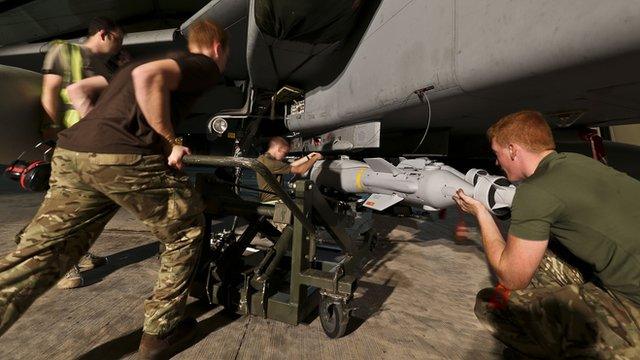Spending Review will shape politics for years to come
- Published
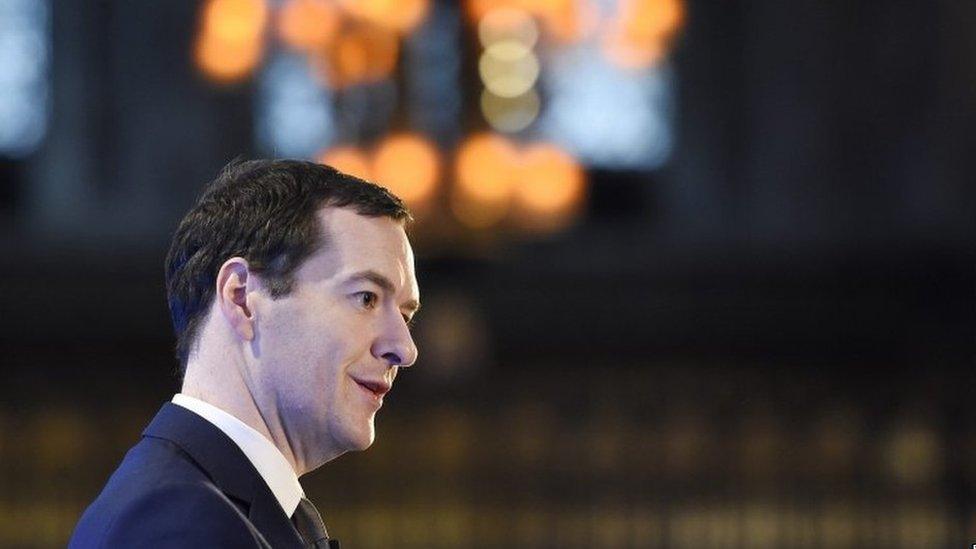
Finding an extra £20bn in spending cuts will not be an easy task for the chancellor
The next four years of this parliament and the framework for the next election will be shaped by the events of this week.
And yet the greatest political impact will come more from George Osborne's Spending Review and Autumn Statement than perhaps from David Cameron's decision to extend airstrikes over Syria or Labour's uncertainty over how to respond.
Clearly the security crisis prompted by the Paris attacks will not be solved overnight and will give a greater security edge to political debate for years to come. Not for nothing are ministers talking of national security in the same breath as economic security.
But the decisions the chancellor makes over how the state spends four trillion pounds of taxpayers' money over the next five years will have greater political resonance when voters go to the polls in 2020.
Mr Osborne has two problems to solve on Wednesday.
First he has to mitigate his planned £4.4bn cuts to working tax credits which were thrown out by the House of Lords. The chancellor is promising some transitional relief, perhaps by introducing the cuts more gradually or targeting fewer claimants.
But he has competing economic and political pressures. If the Chancellor reduces his tax credit cuts, he will have to cut other benefits elsewhere to avoid breaching his self-imposed legal cap on the amount of money the government spends on welfare.
Worried backbenchers
Many MPs expect him to make up the difference by targeting housing benefits instead - perhaps by making claimants pay the first 10%. The risk is that Mr Osborne might end up hitting the same people who would have felt the brunt of the tax credit cuts.
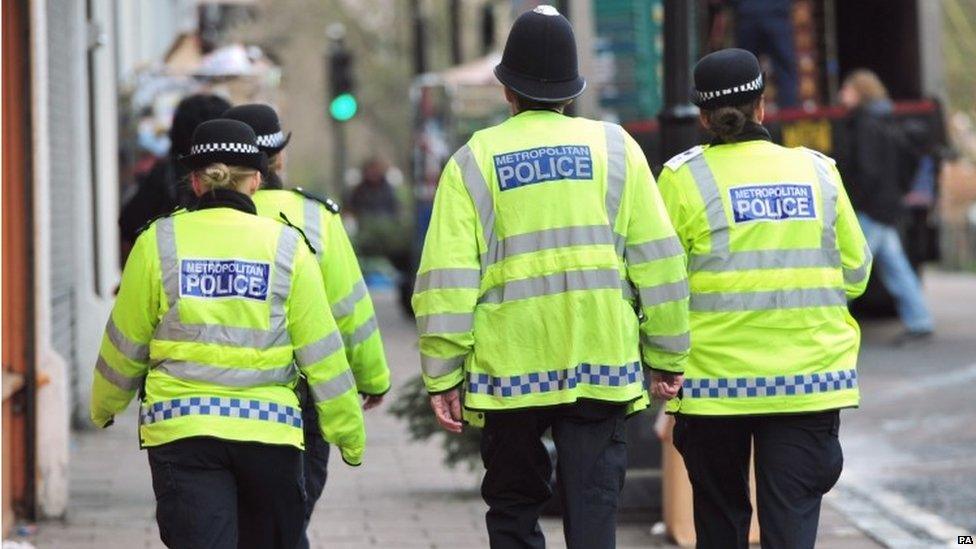
The chancellor is under pressure to relent on police cuts but he says, like other public services, they will have to make savings
And that's not the only dilemma. The chancellor needs to soften the tax credit cuts enough to satisfy worried Tory backbenchers and repair the Tory narrative, namely that the party is supposed to be supporting working people rather than reducing their incentives to work.
But at the same time Mr Osborne also needs to press ahead with the cuts so he can both avoid accusations of a U-turn, and also ensure that the pain is not delayed till the end of the parliament when he hopes to be leading the Tory Party into the next election.

Spending Review 2015 - 25 November

The Spending Review is a five-year projection of government spending. In effect, it decides how £4 trillion of taxpayers' money will be spent by setting caps on government departments. Deep spending cuts are expected as Chancellor George Osborne seeks to balance the books.
Explained: Which government departments will be affected?
More: BBC News Spending Review special report

Problem two for the Chancellor is the impact of spending cuts on the police. On Sunday's Andrew Marr show Mr Osborne strongly indicated that planned cuts to police numbers will go ahead. Now in normal times this would be just another spending reduction that he would have to defend as part of his plans to eliminate the deficit.
But these are not normal times and after the attacks in Paris, he will be under some pressure to avoid accusations that he is letting down Britain's guard at a time of increased threat.
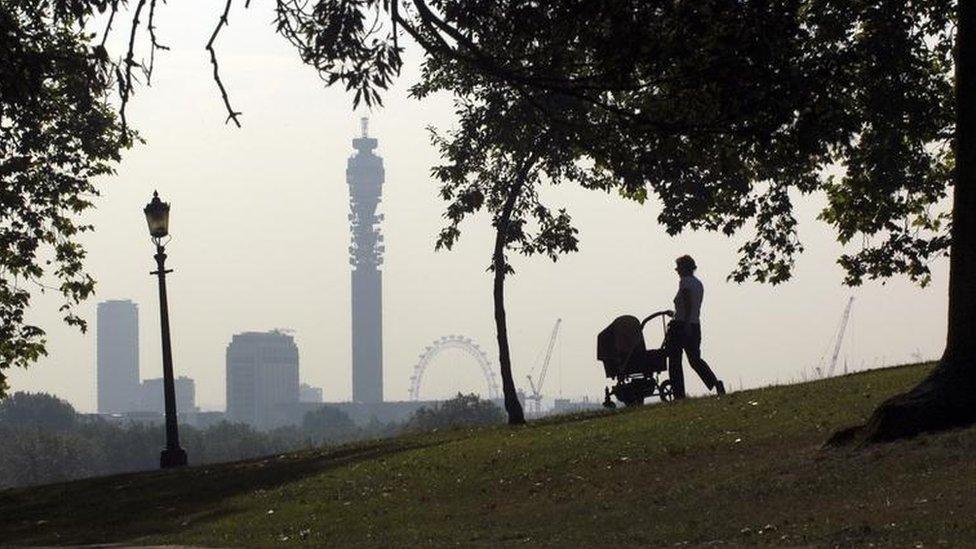
Mr Osborne is having to rethink £4.4bn in proposed cuts to tax credits following their rejection by the House of Lords
So Mr Osborne is emphasising his plans to increase counter-terrorism spending, beef up our cyber defences, and spend more on special forces. But the Home Office has one of the larger Whitehall budgets and the chancellor needs to cut spending somewhere.
And as with tax credits, the concerns are not just felt on Labour benches: many Tory MPs have warned of late about the potential impact on neighbourhood policing which they argue is needed to combat the threat of terrorism. But all the signs are that Mr Osborne will stick to his argument that fewer police has not meant a rise in crime in recent years, in fact quite the opposite.
The bottom line is that finding another £20bn of cuts to public spending will not be easy. It amounts to about a 25% cut for unprotected departments by 2020. The chancellor hinted on the Andrew Marr show that he might even have to water down his target of achieving a £10bn surplus by 2020, something he would be loath to do.
He argues, normally, that if you cannot run a surplus after almost a decade of growth, you never will. But when so much spending is being cut, a surplus of this magnitude might be seen by some as a luxury the government can ill afford.
'Relief for Labour'
As for Labour, after a few weeks of dysfunctionality in response to the Paris attacks, the Spending Review provides the party with the welcome relief of finding some issues around which they can unite. However much they are at odds over the party's broader economic policy, Labour MPs and Jeremy Corbyn are at one in their opposition to cuts to tax credits and police numbers.
Two longer term questions will hang over this week's financial announcements.
First, this might be the last Spending Review where quite so much government spending is protected from cuts. The blessed quintet of untouchable budgets comprises health, schools, defence, state pension and overseas aid. That amounts to about a couple of hundred billion pounds a year.
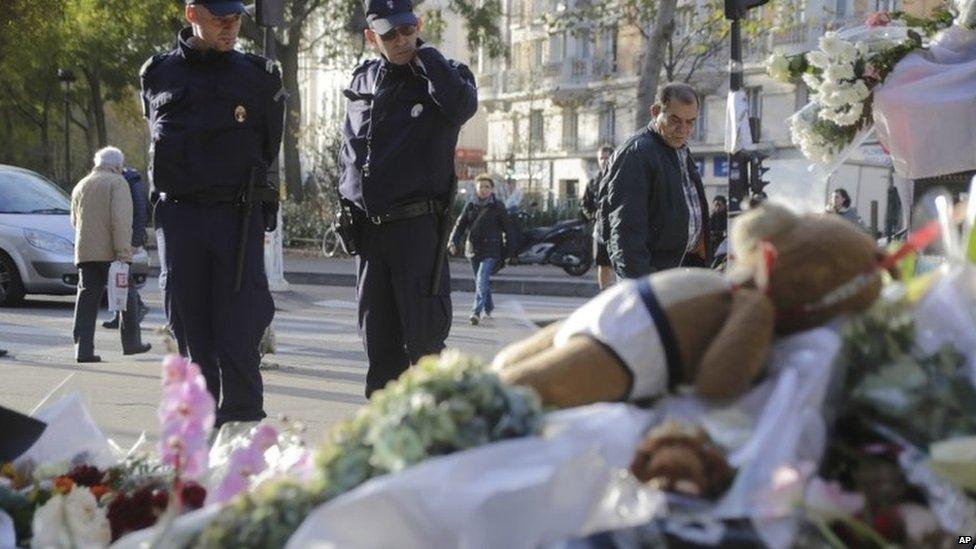
The UK is putting in place contingency plans to respond to terror attacks like those which occurred in Paris
When spending elsewhere is facing such stringent cuts, people might begin to ask tougher questions and ask why these departments should be exempt from the same financial discipline. This is particularly true of health spending which the chancellor is being encouraged to boost in an attempt to smooth over the row with junior doctors over pay.
Second, this might be the Spending Review that finally marks the moment when austerity gains real political saliency. That might sound an odd thing to say after so many years of pain. But over the last parliament, spending cuts were opposed by Labour and other opposition parties but did not appear to change many voters' minds at the general election.
Now, as the cuts bear down harder on budgets that are already tight, it might be possible that people will begin to notice that their parks are less well tended, their streets dirtier, their library opening for fewer days, their street lights on for less time, their bus service less frequent, their local care home closing. And if that happens, as we have seen with tax credits, the politics can suddenly get tricky.
So there are some tough choices to be announced on Wednesday that will shape politics for years to come. George Osborne may privately be quite content that the political debate will move swiftly on, probably the next day, when the prime minister makes his case for sending RAF jets into Syria.
At the very least, those pesky policy wonks from the Institute for Fiscal Studies will get less airtime to mark the Chancellor's homework, as they traditionally do the day after every fiscal event.
- Published18 November 2015
